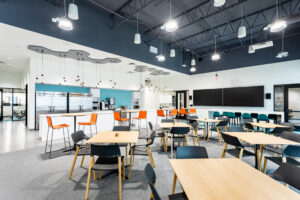

BioLabs Pegasus Park lab space is geared for young life science companies
Life science startups account for just 8% of global startups but are the second largest driver of investment capital, according to a 2022 report. Cell and gene therapies, machine learning technologies and other innovations have spurred the growth of life science companies. But the life science sector gained attention during the Covid-19 pandemic in a way that it hasn’t had for a long time. The pandemic highlighted the critical role the life science industry plays in creating diagnostics for viruses, disease, and precision medicine.
The establishment of a “marquee” location in Dallas for BioLabs Pegasus Park, initiated by Lyda Hill Philanthropies, helped the organization attract a robust number of early stage life science companies in its first year. Because BioLabs Pegasus Park is a university- and institution-agnostic incubator, there is no perception that it has a bias towards any one organization. It offers a level playing ground for life science innovation. Although BioLabs usually has to conform to a given space, the Pegasus Park location is a space built for the incubator, so it offers a lot more resources than other sites typically provide.

Gabby Everett
Dr. Gabby Everett is the site director for BioLabs Pegasus Park. Since the incubator opened in Dallas last year, it has reached 85% capacity, an impressive accomplishment. Everett said the fact that they have surpassed expectations demonstrates not only a huge demand for lab space for life science startups in the region, but also the ability of the incubator to attract those companies, given the keen competition around the country.
“North Carolina and Massachusetts are our two main rivals for biotech companies. Boston is having trouble filling biotech jobs so there is a need for innovative approaches to building a pipeline of experienced workforce staff for the biopharma industry,” Everett said. “We’re building an ecosystem to foster, develop, and support a biotech workforce region wide,” she added.

BioLabs Pegasus Park
BioLabs works closely with BIO North Texas, the regional chapter of BIO, a global biotech trade association. Everett pointed to BIO’s annual conference in June as a great example of the kind of attention North Texas companies are beginning to see. She reported many productive meetings, drawing the envy of Boston competitors. Everett also noted that the Dallas Regional Chamber hired a VP of Life Sciences, Kelly Cloud, underscoring the priority the region places on supporting life science companies.
Finding enough qualified staff for the biopharma sector has forced cities to compete with each other to attract them. Factors like taxes and bench costs at life science incubators can mean the difference between a company choosing one city over another and bringing the jobs and innovation that accompany that decision. North Texas boasts lower taxes than its Northeast competitors, which can help persuade companies to take their business south. Leasing bench space in Boston, for example, can cost roughly $4,000 per bench per month compared with $1,800 per bench per month in Dallas.
As BioLabs nears capacity on the Pegasus Park campus, a new lab space is under construction. J. Small Investments, Montgomery Street Partners, and an affiliate of Lyda Hill Philanthropies has implemented construction of Bridge Labs. When the space opens in 2024, it will be a 135,000 square foot purpose-built research and development space. Bridge Labs will include the first institutional-quality, non-incubator space in the region with upgraded power, HVAC and gas service, state-of-the-art laboratory amenities, and shared spaces. Bridge Labs will also offer prebuilt lab suites that will provide the tools and flexible space needed for growth-stage life sciences entrepreneurs and companies.
Sam Johnson, a principal with Montgomery Street Partners, explained that this project with the City of Dallas will foster local innovation and attract new life sciences and healthcare companies and institutions to the region.
Education and building the life science workforce
In another initiative to support life science workforce development, BioLabs is collaborating with partners at community colleges. Through the program, high school graduates have the opportunity to earn biotech certifications for lab support and biomanufacturing roles through community college programs, Everett said.
Participating institutions include Dallas College, Collin College, Tarrant County College, the DFW Hospital Council Foundation, Bio North Texas and The University of Texas at Arlington.
But the initiative starts well before young people reach college age. Regional efforts to push life science innovation include engaging young people in potential careers in life sciences from childhood. Along the pathway from BioLabs to the Pegasus Park tower, a cluster of orange statues greets visitors. They are part of a STEM initiative from Lyda Hill Philanthropies called #IfThenSheCan. Each statue represents a woman who made a name for herself in STEM in areas such as ecology, zoology, biotech and more. Visitors can use their phones to scan a QR code on each statue to learn more about the woman depicted. By increasing awareness of life science careers, the long-term goal is to excite curiosity in these fields from an early age, especially for young girls, and plant the seeds to grow the future life science workforce.
On a recent visit to the incubator space, it was bathed in natural light because the offices, meeting rooms, and the lab space at the heart of the building are walled in glass. This underlines the transparency and openness BioLabs wants to provide. You can always see when someone is on the phone, speaking with others, or available for a chat. It’s the kind of environment that encourages collaboration.
Gesturing to the lab facility, Everett referred to it as “our science playground.”
Although other incubators charge for access to specialty lab spaces or the access is limited and companies have to pay extra for equipment use, Everett noted that BioLabs takes an all-inclusive approach. Its partners support the incubator’s lab infrastructure. One of its largest partners, Thermo Fisher Scientific, provides state of the art equipment including thermocyclers and a flow cytometer. PHCBi provided discounted cold storage and incubation equipment. Millipore provided a water system, which they installed and continue to maintain, while Elemental Machines provided cold temperature and incubator monitors. Companies also receive room in the lab’s cold storage space. Each new company that joins BioLabs Pegasus Park receives a set of six pipettes. If they need more supplies, they can use the scientific product vending machine, which is stocked with buffers, media, and other lab must-have items.
“We are working on the ‘what’s next?’ lab space. We are built to grow with companies,” Everett said. BioLabs is founder and investor friendly. It doesn’t take equity and it doesn’t demand first right of refusal.
Companies that call BioLabs Pegasus Park home
Many companies that have spun out of local universities have offices in the incubator and are pumping out new technologies. Several companies have also moved to BioLabs Pegasus Park from outside of Texas.
EtiraRx is a biotech that seeks to support patients with untreatable, therapy-resistant cancers with new approaches designed to overcome the obstacle of tumor heterogeneity, which thwarts effective cancer therapy. Lead indications are metastatic breast cancer, ovarian, pancreatic and glioblastoma.
ReCode Therapeutics was one of the first tenants of the Texas incubator. It’s developing gene therapies and treatments for orphan diseases. The company’s lead drugs focus on primary ciliary dyskinesia and cystic fibrosis.
Secretome Therapeutics is a biotechnology company developing first-in-class therapeutics derived from neonatal mesenchymal stem cells (nMSC) for the treatment of underserved diseases. Their lead product, STM-01, is in development for adult and pediatric forms of heart failure, and their pipeline includes novel secretomes for neurodegenerative and dermatological diseases. The CEO of Secretome, Vinny Jindal, previously served as the Vice President of Strategy at Reata Pharmaceuticals and CFO at Reneo Pharmaceuticals.
TraumaCare.AI seeks to give clinical teams real-time, patient-specific risk predictions, precise data, and help them to make better decisions. It has a user interface geared to trauma and ICU workflows. The CEO and Founder, Vikas Chowdhry, is on the faculty of UT Southwestern Medical Center’s Graduate School of Biomedical Sciences.
Nonprofits
Adjacent to BioLabs North Texas is Pegasus Park which houses a group of 35 nonprofits that fit into the 175,000 square-foot social hub dubbed Water Cooler. Sponsored by Lyda Hill Philanthropies, in partnership with J. Small Investments and Montgomery Street Partners, and managing partner The Dallas Foundation, space options are designed to be flexible to accommodate each nonprofit’s needs. Water Cooler’s mission is to support organizations in their journey to attract and retain talent, enable collaboration among members, cut administrative costs, and increase the collective impact on key social issues.
Among the 35 tenants are the Carson Leslie Foundation for pediatric cancer research, the Grant Halliburton Foundation to promote mental health support for teens and young adults, Leukemia Texas, and more. Water Cooler at Pegasus Park is one of the largest nonprofit shared spaces in the country.
“Water Cooler has become home to an exceptional group of organizations that embrace the idea of sharing space to foster meaningful collaboration in service to their missions,” said Lyda Hill, Entrepreneur and Founder of Lyda Hill Philanthropies, in a press release. “I look forward to continuing to see positive results from the Water Cooler tenants as they individually and collectively address major issues in our community and beyond.”
As cities increasingly compete with each other for companies and talent in the life science sector, the resources and collaborations they forge will only grow in importance. The incubators that can foster public-private partnerships and provide meaningful services for early-stage companies will be poised to attract the best companies. BioLabs Pegasus Park offers some helpful guidance on how to achieve these aims.












